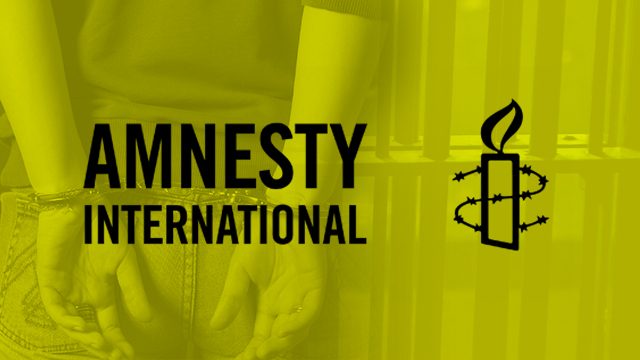SUMMARY
This is AI generated summarization, which may have errors. For context, always refer to the full article.

MANILA, Philippines – Global human rights group Amnesty International urged lawmakers in the country to reject the revival of the death penalty, one of the priority bills of President Rodrigo Duterte.
“The re-introduction of the death penalty would not only represent a major setback for the promotion and protection of human rights in the country but also violate the Philippines’ obligations under international law,” said Amnesty International in a statement on Friday, November 25.
“The Philippines, which fully abolished the death penalty for the second time in 2006, is party to an international treaty that categorically prohibits executions and commits the country to the abolition of this punishment. These obligations cannot be withdrawn at any time.”
In his first month in office, Duterte had asked lawmakers to revive the death penalty, especially for drug traffickers. The war on drugs has been one of the key campaigns of the government since Duterte took office last June 30. (READ: IN NUMBERS: The Philippines’ ‘war on drugs’)
For the President, the death penalty is a way to exact payment from a perpetrator of a heinous crime.
Speaker Pantaleon Alvarez earlier led several lawmakers in filing measures seeking to restore capital punishment for heinous crimes. The Speaker wants the House of Representatives to pass the consolidated version of the bills on 3rd and final reading by December. (READ: Congressmen want 9-year-olds charged for crimes)
Last month, the House justice committee also recommended the reimposition of the death penalty for drug-related cases.
The House independent minority bloc has accused the justice committee of “railroading” the passage of the death penalty bills.
At the Senate, Senator Manny Pacquiao has also echoed Duterte’s desire to bring back the death penalty. Pacquiao even went as far as saying that God supports the death penalty to “punish” and “discipline wrongdoers.” (READ: Death by hanging? Pacquiao jokes, ‘Sisipain lang po ‘yung upuan’)
Amnesty International and other human rights groups have long said, however, that there is no evidence to prove that the imposition of capital punishment deters crime.
“There is no conclusive evidence that the death penalty has a deterrent effect. Statistics from countries that have abolished the death penalty show that the absence of the death penalty has not resulted in an increase in the crimes previously subject to capital punishment, while evidence shows that punitive policies have little influence on the prevalence of drug use,” Amnesty International reiterated on Friday.
The Philippine government, the group also pointed out, has been issuing appeals on behalf of Filipinos on death row in other countries.
“[Reviving the death penalty would] undermine the country’s strong track record of advocating for the commutation of the death sentences imposed on Filipino nationals abroad, such as overseas workers,” said Amnesty International.
One of the most recent high-profile cases involving a Filipino on death row is that of Mary Jane Veloso, who is behind bars in Indonesia for alleged drug trafficking. Veloso had been given a last-minute reprieve in April 2015, following a plea from former president Benigno Aquino III and the surrender of her supposed recruiter Maria Cristina Sergio. (READ: Mary Jane speaks up one year since she escaped execution)
If the Philippines revives the death penalty, it would be going against the global trend, said Amnesty International.
“As of today, 141 countries—more than two-thirds of the world’s countries—have abolished the death penalty in law or in practice,” the group said.
“The number of countries that carry out executions has also been declining, with only 11 countries known to have carried out executions every year in the past 5 years. In 2015, 169 (88%) of the 193 UN Member States were execution-free.”
The 1987 Philippine Constitution abolished the death penalty but allowed Congress to provide for it for compelling reasons involving heinous crimes. It was imposed in 1993, but was again abolished in 2006.
“The Philippines ratified the Second Optional Protocol to the International Covenant on Civil and Political Rights, aiming at the abolition of the death penalty, on 20 November 2007,” noted Amnesty International. – Rappler.com
Add a comment
How does this make you feel?





There are no comments yet. Add your comment to start the conversation.